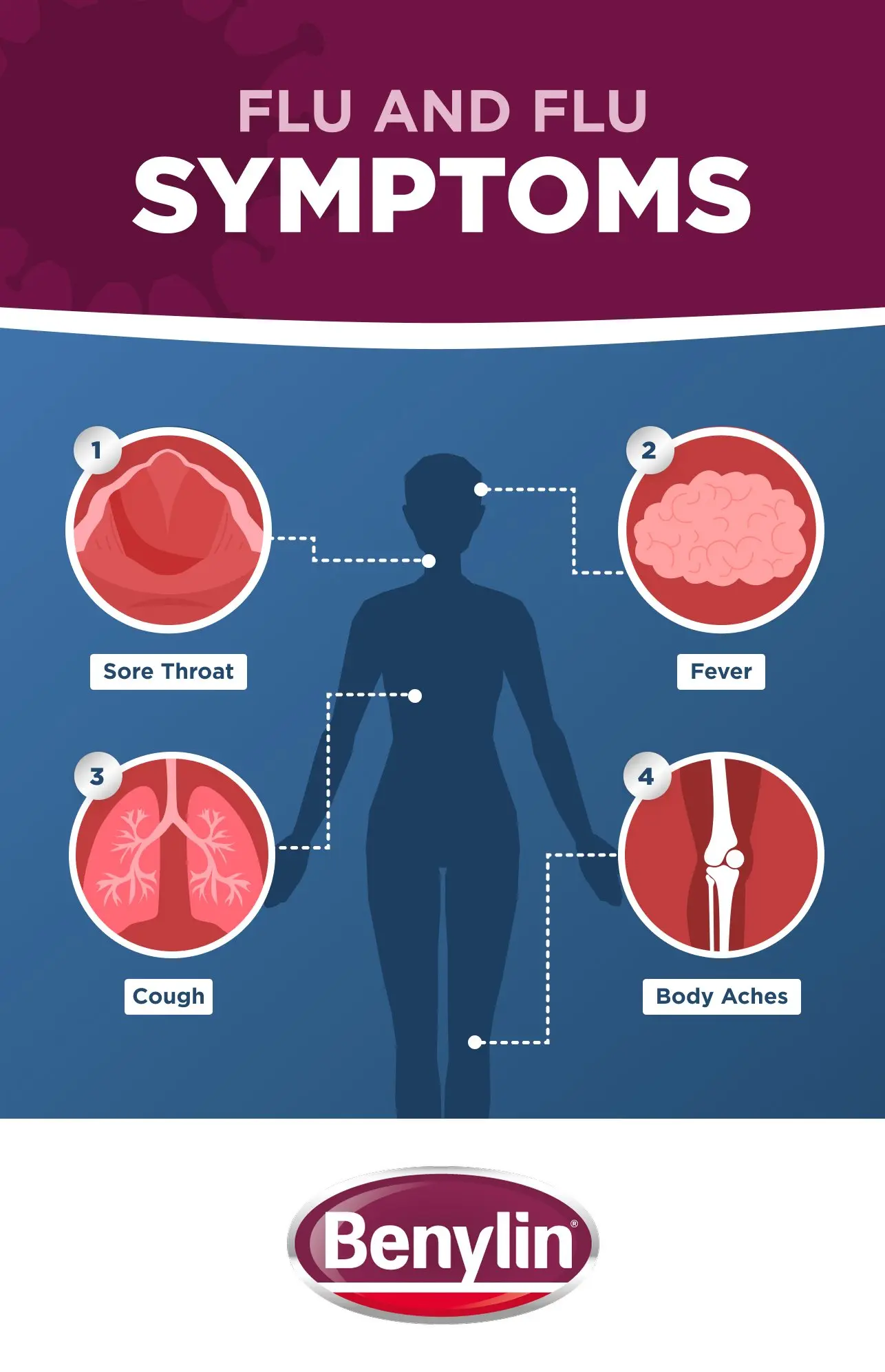The flu, or influenza, is a common viral infection that typically gets better on it’s own. However, in some rare cases, it can require medical attention.
Here, we’ll take a look at the symptoms, causes, and common treatments for the flu. We’ll explore the things you need to look for, and how you can best treat them.
In this guide:
What is flu?
Influenza, better known as the flu, is a common illness caused by a flu virus. Generally, the flu is spread through coughs and sneezes, but you can also catch it by coming into contact with surfaces that have the virus on them. You can catch the flu at any time of the year, but infection rates tend to rise sharply in winter.
It’s not uncommon to mistake the flu for the common cold because the symptoms can be similar. However, there are some key differences. The flu is caused by different viruses, the symptoms tend to last longer, and the effects are often more severe.
Flu Symptoms and Treatment Options
One common feature of the flu is that the feeling of being unwell comes on quickly. Typically, you’ll start to feel poorly within a few days of infection. The flu symptoms should ease after around a week, though some lingering symptoms, such as tiredness, may be present for longer.
You can spread the flu infection onto others from a day before your symptoms start showing. You’ll remain infectious for up to a week after your symptoms develop. Children and those with weakened immune systems may be infectious for a longer period.
Common symptoms of flu
Here we’ll explore the various flu symptoms you can likely expect to experience.
Fever
Fever is one of the common symptoms of the flu, and one of the distinct differences between a cold and the flu. Typically, a fever is a sign that your body is fighting off an infection or illness. When you become sick, the part of your brain that controls your body temperature (the hypothalamus) sets your temperature higher than usual.
A fever should last around three to four days if you have the flu. If you have a fever, you may also experience a range of symptoms that come with it. These may include feeling weak and irritable, feeling chilly and shivering, and sweating. You might also develop a headache, lose your appetite, or become dehydrated.
Cough
Another common symptom of the flu is a cough or chest discomfort. While you might experience coughs and discomfort with a cold, they tend to feel more severe if you have the flu.
Coughs may feel irritating, but they’re actually an effective form of defense, as they can help to clear germ-filled mucus from your lungs. When you’re ill, your body will create mucus to help prevent infection. When present in the lungs, this is known as phlegm.
In the early stages of the flu, dry coughs can be present and occasionally, this can include wheezing and tightness in the chest. You may also find you’re coughing up phlegm and mucus, though this is less common during the early stages of the flu.
Sore throat
Sore throats are a common symptom of the flu virus but are also closely associated with colds. If your sore throat is accompanied by a cough and a runny nose, it’s likely that you have a cold.
If you’re coughing a lot due to flu, it may result in a sore throat. However, it’s still possible to feel a sore throat without a cough. You may also feel an unusual sensation when you swallow, and your throat may be scratchy and irritated during the early stages of the flu.
Body aches and pains
Another common symptom associated with the flu is body aches. Like a cough, body aches are also associated with colds, though you can expect worsened symptoms with the flu. As your body is working hard to recover, it can cause inflammation, which can lead to you feeling sore and achey.
During the early stages of the flu, it can be easy to dismiss body aches because of the numerous causes for an ache, such as exercise. You can feel aches anywhere on the body, but with the flu, they’re most common in the back, legs, and head. It’s also not uncommon for chills to accompany body aches.
Flu treatments
Fortunately, there are multiple ways of managing symptoms of the flu. Here, we’ll explore the different treatment options available to help alleviate your symptoms.
Fever treatment options
As uncomfortable as a fever can be, most people will start to feel better with treatment. The most accessible treatment for a fever can be found in your home. Drink plenty of water to keep yourself hydrated. Lukewarm baths and resting can help with fever accompanied by aches and chills, while keeping yourself cool with lightweight clothes and bed coverings can help you feel more comfortable if you have a fever. You can also take over the counter drugs to alleviate pain and other flu virus symptoms.
Cough treatment options
If you’re struggling with a cough because of the flu, cough medicine can help ease the symptoms. With Benylin® you can find medicine to help with all types of coughs – from chesty coughs and mucus coughs to dry and tickly coughs. You should also make sure you’re staying hydrated.
Sore throat treatment options
Sore throats can be uncomfortable but typically, they’re nothing to worry about and will normally improve on their own within a week or so. While you’re waiting for things to get better, there are a handful of things you can do to manage your symptoms. Drinking plenty of water and sucking on ice cubes, ice lollies, or hard sweets can help alleviate symptoms. Gargling salt water and getting plenty of rest can also help with a sore throat.
There are also a range of medicines that can soothe pain caused by a sore throat. Medicated lozenges, anaesthetic spray, and paracetamol are all available from a supermarket or pharmacist without a prescription.
Body aches and pain treatment options
Resting your body and staying warm can be one of the easiest ways to relieve the symptoms of body aches and chills from the flu. You can also take ibuprofen to help alleviate discomfort and pains.
When to see your GP about flu
If you’re fit, healthy, and don’t have any long-term health problems, your body should be able to fight off the flu and you should start to feel better after a week or so. Often, the best remedy is to rest and ensure you stay well hydrated. Benylin‘s® cold and flu range can also help relieve your flu symptoms. Additionally, it‘s recommended that you stay updated with flu vaccinations and get a booster each year.
You should get an urgent GP appointment if you have the flu and:
Are over 65 years old
Are pregnant
You have a weakened immune system
You have a long-term health condition.
You should also seek medical advice if your flu symptoms don’t improve within seven days, or if your child has flu and you’re worried about them.
Call 999 or immediately go to A&E if you‘re struggling to breath, are suffering with sudden chest pains, or if you cough up blood.


